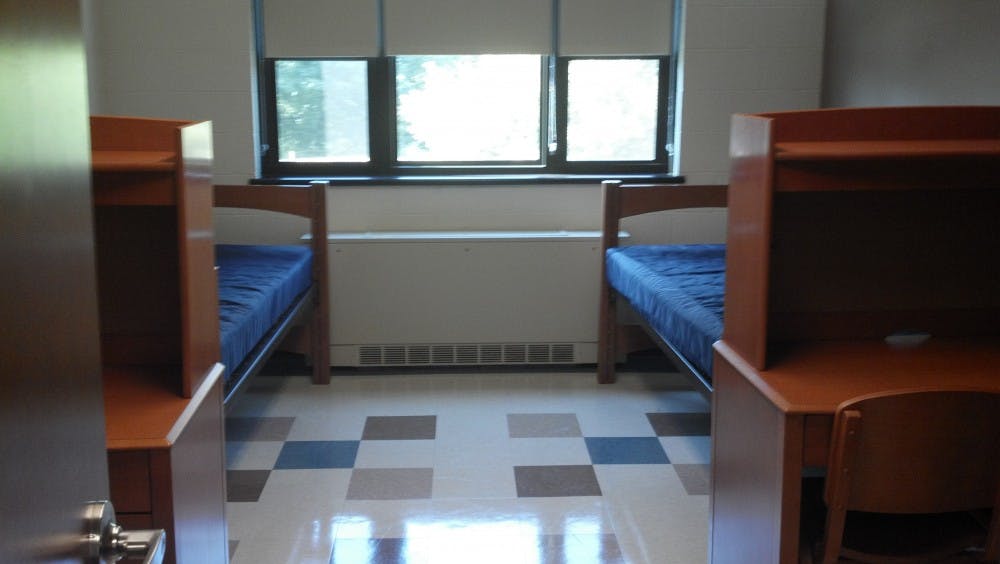By Krista Savage, News Editor
At least 150 Miami University resident assistants (RAs) are outraged by a controversial change the university will implement this fall.
Many RAs, who have traditionally lived in single dorm rooms, now have to room with their first-year residents until October, at the earliest.
This setup is necessary because Miami does not have enough accommodation to support the number of incoming first-years this fall. The number of students who confirmed enrollment was larger than originally anticipated by the Office of Resident Life (ORL) and the Housing (H.O.M.E.) Office.
The RAs began receiving emails about the capacity issue in May - after RAs for the 2015-16 school year had committed to their positions and signed contracts - and those who would have a resident-roommate received an email on June 22 informing them of their living situation.
Based on current numbers, 71 resident assistants will receive first-year roommates in August.
Many RAs, like senior Jaylene Wallick, have expressed concern about living with a resident. The situation may be uncomfortable for both parties, given the responsibilities of the RA to enforce residence hall rules and regulations.
"Frankly, there isn't anything right about it," Wallick said. "My initial response was that it seemed ridiculous. I did not believe that it would be an issue and honestly thought ORL would work out something and we would not be in this situation."
However, many resident assistants fear this new setup will compromise their job duties as well as the independence of the first-year students.
"From a resident's perspective, I personally feel that it would take away from their experience at Miami having to live with an RA," said Alexa Weiland, senior and resident assistant.
Weiland said the beginning of the year is an important time for RAs to interact with residents. It is a major transition period, especially for first-years.
"I was very upset," said a junior resident assistant, who asked to remain anonymous. "RAs use their rooms not only as a place to sleep and relax, but it's also very much a workspace for us and our residents. I thought this decision would yield various conflicts of interests and would breech confidentiality between RAs and residents by having another resident share our workspaces."
Enjoy what you're reading?
Signup for our newsletter
RAs assigned to roommates were offered the option of switching to a different residence hall and acquiring a new living learning community (LLC), which would relieve them of the roommate requirement. Wallick and Weiland both took this option.
RAs who did not receive a roommate were offered the option of moving to a residence hall that required roommates, where they would receive additional compensation.
All resident assistants affected by these changes will receive an additional $100 every week they have a roommate, plus one $500 Miami bookstore gift card.
Since hearing about the changes being implemented this fall, Miami resident assistants took action by starting a petition. It was signed by 150 RAs and sent to President Hodge, the ORL and the H.O.M.E. Office.
"The main purpose of the petition, from my viewpoint, was to voice the concerns of RAs having roommates to the general public as well as bringing forth major concerns of confidentiality and conflict of interest to the administration," said another junior RA who wished to remain anonymous.
Brian Woodruff, Director of the H.O.M.E. Office, and Jerry Olson, Director of Resident Life, said the goal is to have RA roommates assigned to permanent rooms by mid-October. However, that hinges on a certain number of first-years not arriving for the fall semester in August, or withdrawing from the university by October.
Despite the unexpected circumstances, Woodruff remains optimistic.
"We hope the result of having RAs temporarily have roommates will result in more students being able to live on campus and be warmly welcomed by the RAs," Woodruff said.
Many students will also live in Hawk's Landing for the academic year due to insufficient housing within the residence halls. Both this and the RA setup are intended to be for this year only.
Correction: Because of a reporter's error, a previous version of this article stated that Miami is using Hawk's Landing to house first-year students. Miami is using Hawk's Landing for sophomore and transfer students.




